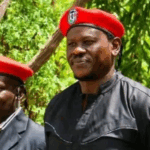
Ugandan President Yoweri Museveni has for the first time acknowledged that two Kenyan activists who were missing in his country for five weeks had been arrested.
Last month, eyewitnesses reported seeing Bob Njagi and Nicholas Oyoo being forced into a car by masked uniformed men after a political event where they were supporting Ugandan opposition leader Bobi Wine.
News of their release was confirmed on Saturday but up to that point the authorities had denied that they were being detained.
In a live interview on Saturday evening, Museveni described the two men as “experts in riots” who had then been put “in the fridge for some days”.
The president, who has been in power for almost four decades and is running for another term in office, was responding to a question about the recent deadly youth-led protests in neighbouring Tanzania.
Museveni blamed foreign groups for stoking up trouble and said “the ones who are doing that game here in Uganda will end up badly”.
Without naming them, he added that the two Kenyan activists were released after he received calls from “some Kenyan leaders” who said they should be handed back.
On Saturday, activist organisation Vocal Africa confirmed the men were safe, and being transported from Busia in Uganda to Kenya’s capital, Nairobi.
“Let this moment signal an important shift towards upholding the human rights of East Africans anywhere in East African Community,” the organisation wrote on its Instagram page.
In a joint statement, Vocal Africa, the Law Society of Kenya and Amnesty International thanked the Kenyan and Ugandan governments, as well as “all active citizens” campaigned for the release.
Former pop star Bobi Wine, whose real name is Robert Kyagulanyi, is running against Museveni for the presidency in next year’s elections.
Bobi Wine accused the Ugandan government of targeting the two Kenyans for associating with him.
“If they committed any offence, why were they not produced before court and formally charged?” he asked in a post on X on Sunday.
Ugandan security agencies have often been accused of orchestrating the detention of opposition politicians and supporters while not in uniform. Some of those arrested have later resurfaced in court facing criminal charges.
The latest disappearances mirror past incidents involving politicians and activists across the East African region.
Last year, Njagi was picked up in Kenya by masked men during a wave of abductions believed to have been targeting government critics in the country.
He surfaced a month later, after a court ordered police to produce him. He later recounted the harrowing conditions in captivity, where he said he was often isolated and denied food.
Earlier this year, Kenyan activist Boniface Mwangi and his Ugandan counterpart Agather Atuhaire were detained in Tanzania and held incommunicado for days before being abandoned at their respective national borders.
They later recounted being brutally mistreated, including sexual torture at the hands of the Tanzanian authorities – allegations which police dismissed as “hearsay”.
Last year, another Uganda opposition figure, Kizza Besigye, mysteriously disappeared in Nairobi only to surface four days later in a military court in Uganda, where he faces treason charges.
The cases have since sparked widespread condemnation and concerns that East African governments could be collaborating to contain dissent.